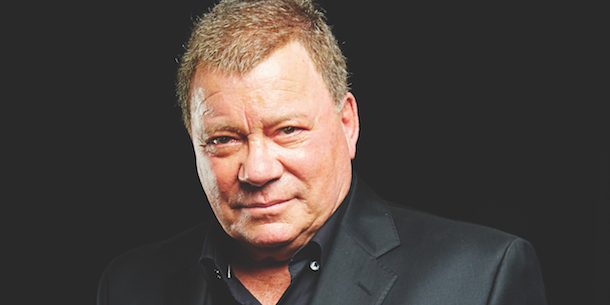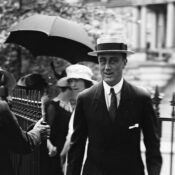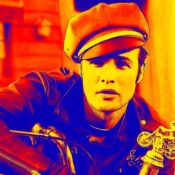William Shatner has been on a voyage of personal discovery that is bolder and more ambitious than his exploration of the galaxy at the helm of the USS Enterprise. Beyond his legendary role as Star Trek’s Captain Kirk, he’s been a best-selling sci-fi author, singer, prize-winning horseman, commercial spokesman, and director. “Star Trek carved a path to the future, and that continues to inspire me,” he says of his continuing adventures at 86.
Shatner has written more than 40 books. He started with novels based on Star Trek, but his latest is the second in the futuristic Zero G series (co-authored by Jeff Rovin) called Green Space. The hero is 80-year-old FBI agent Sam Lord. Aboard the space station Empyrean, there is a vine designed to reach Earth that starts growing out of control. There is a character who can change gender at will. And to keep the mystery going, there is a rivalry with China and Russia.
Shatner has a delightfully quirky and offbeat sense of humor. So his serious and introspective side can surprise people.
On Science Fiction
Jeanne Wolf: Great scientists respect sci-fi creators like yourself.
William Shatner: Science fiction these days is only half a step ahead of science. Astrophysicists and scientists are working in the same way as science fiction writers. They’re working things out in their imagination based on the slim scientific facts that they know. Hawking imagines a black hole and then discovers the mathematics that support his theory, and new possibilities come to light. That’s the imaginative flair that scientists have to have. For me as a sci-fi writer, spinning those ideas in your mind brings you to the point where you dream in science fiction. Suddenly you think of something in the middle of the night, and it’s so vivid you don’t need to write it down because you know you’ll remember it in the morning. That’s what these books, Zero G, reflect: a vivid imagination.
JW: Having talked to some of the great thinkers of the world and asked yourself for years and years these questions in your mind, have you come up with any answer for why we exist and what the future holds?
WS: The dilemma, I think that would be the right word, is that we poor human beings have no answer even though we want one. There are so many mysteries around us. As a grandfather, I’m frustrated in not being able to impart the knowledge that I have. I can’t get it into the heads of my grandchildren fast enough because they want to look at their phone or play with their siblings. I’ve gotta be on guard that I’m not trying to be the teacher all the time. As a loving grandfather, I want to give them everything that I’ve acquired, but they’re going to have to make it their own way, and sometimes that’s painful. If the reality is that in a few billion years, the Earth will cease to exist and all remnants of anything that was thought of as human will be destroyed, you wouldn’t want to go through the challenge of living and then the pain of dying. I wonder if, at death, I’ll know the answer in an instant or in the moment. We have rose colored glasses, though. “It’s not gonna happen to me,” I say to myself. “I’m 86 and I’m not gonna die.” The biggest blessing of all is my health. The fact that I’m healthy and energetic and strong and my mental capabilities are still there, I don’t want to let go.
JW: I love that you made the hero of these two books 80 years old. It made me wonder if you’d turn down a chance to play Captain Kirk again.
WS: What we did in the books wouldn’t happen in Hollywood. If you’re going to make a movie of this book, they would never cast an 80-year-old man. It’s been 50 years since I first stepped on the set of Star Trek. I don’t know if the audience could take the shock of Captain Kirk at my age. It’s embarrassing sometimes. People, some kids, are thinking they’re going to meet the Captain Kirk they saw on the screen, and they’re looking right through me. It’s like, “It’s me! I’m here.” I used to be driven out of fear and anger, and then it became curiosity, and then it became amazement at the adventures that very few people could have that I have had. I would rather grasp them and maybe not do them as well as I’d like but at least attempt to rather than deny them because I was fearful.
On Aging
JW: Your main character in Zero–G says that as you get older, things have a brighter side and you get more optimistic. Is that true?
WS: Well, yes on certain subjects. Not optimistic that the universe is cold and hard. Whether there’s a benign being at the head of that who will comfort you and take you into her bosom, that gets more frightening.
JW: You are always going and going. You seem happy at this point in your life.
WS: Passion, romance, family, and curiosity are what keep me going. Everything I do is personal. I love to perform. I love the puzzle of putting the pieces of a character together. I love to be in love; I love to write about things that baffle us. Coming up with innovative solutions makes me ecstatic.
On Politics
JW: On Star Trek, part of the idea was trying to make peace in the world. Of course, enemies always come up. In this book, the Russians are still the enemy.
WS: It’s only 50 years in the future.
JW: Do you think they still will be? And if so, does that make the book all the more relevant in terms of the news and all the talk about whether Russia is our friend or out to get us?
WS: We took as the political situation that China and Russia would still be major powers and would be our rivals even in 50 years. Look what happened 50 years ago. After World War II, Germany became a power, China has risen, Russia is still there, everybody is vying for second, third, and fourth, but America is the leading power 50 years later; 50 years is not a long time. The geopolitics of it will be basically the same, we think. In that, everybody is vying for influence and to be able to sell their products.
JW: So the competition isn’t going to stop?
WS: The competition will always be there inasmuch as the caveman fought the other caveman for the rights to kill the pterodactyl.
JW: At the end of the book, two people who start out on opposite sides make a pledge that they won’t use the secrets they found out for any nationalistic gain.
WS: Right. It’s called the Hitler-Stalin pact.
JW: So you’re saying that’s a very nice promise in a book but the competition will always be there and we’re always going to go for our country?
WS: Yes. That’s in our genetic structure: loyalty to the clan. That’s how morality started. That’s how humans have been able to live — by clinging together in packs. The packs, like any other animal group, compete against each other, and when you have weapons of mass destruction, the competition becomes very bad.
On Ecology
JW: The environment is very important to you. What can you say to get that message across? I loved the scientist who said, “We’re going to mess up this planet and then we’re going to go mess up another one.”
WS: I’m starting to work in solar power. I signed an agreement with a company to talk about solar power. The reality is that I have dear friends who are ecologists. It’s really bad. The condition of the world is really bad and I’m a grandfather. You and I will be out of the mess before it becomes really bad, but our grandchildren will not be. It’s for them that we have to stop what we’re doing. The world will not exist the way we want it to if we continue the way we’re going.
I try to do what I can do. I talk to people like yourself to get that message across. If it appears in print or in front of a camera, maybe I can convince one person. Wouldn’t it be nice if we could convince Trump?
JW: We don’t want that to be the only quote, but wouldn’t it be nice! Finish your thought.
WS: Well, the thought is that there is no argument. People who are arguing about climate change are the people who can’t stand that the world is coming to an end.
On Family
JW: You dedicate this book to your wonderful family. When you describe being with your daughters and your grandchildren and your daughters’ husbands, I don’t think people know that family loving side of you.
WS: I was very reluctant to do a cruise that involved fans on the boat — 2,800 fans on a boat with me. So I said to the entrepreneur, “I want to take my whole family.” It’s 14 people. There’s a whole deck that is totally private. So for seven or eight days on a private deck, with the exception of the hours that I had to go perform, I sat with the 14 members of my family from breakfast until sleep time. I sat on the deck, we swam in the pool, we ate the meals, and everybody would go to their rooms or come back. It was a continual flow of family and it was the most beautiful time you can imagine. Being catered to, having to do very little work, and everyone being so happy. It was a wonderful family thing.
JW: Okay. I want to ask about your wife. I’ve been married a long time and when people ask me what makes a happy marriage, I don’t know how to answer. How do you answer why that works and why she’s the right woman for you?
WS: Most of it is her patience with me. (Laughs) But we have a lot of mutual interests besides the children and home and all the arts that go into making a home. A major factor is our obsession with horses and competing with horses and breeding horses and loving horses. It brought us together to begin with, and I’m sure it’s a big factor in keeping us together.
JW: What would you say if I asked you what she does to make you feel loved?
WS: She loves me.
JW: Is that the same way you try to make her feel loved?
WS: Yes. I like to think I do my part, but she’s very good at it.
JW: How do you feel that?
WS: Well, sometimes it’s the look in the eye, it’s the phone call at a precipitous moment, it’s the arms around me — flesh against flesh.
An abridged version of this interview is featured in the September/October 2017 issue of The Saturday Evening Post. Subscribe to the magazine for more art, inspiring stories, fiction, humor, and features from our archives.
Become a Saturday Evening Post member and enjoy unlimited access. Subscribe now



